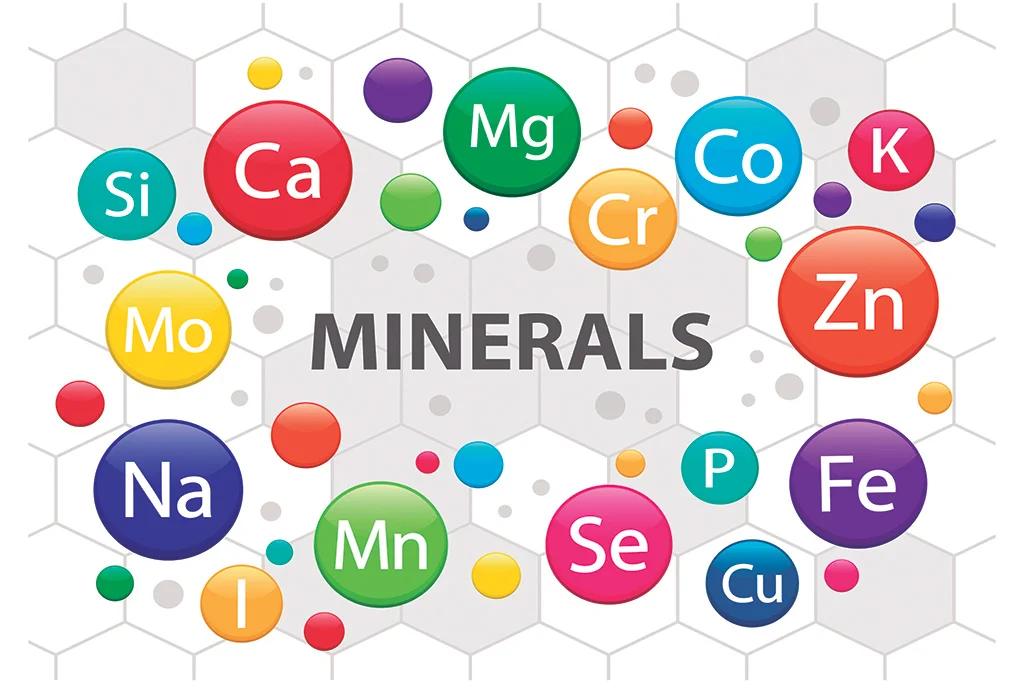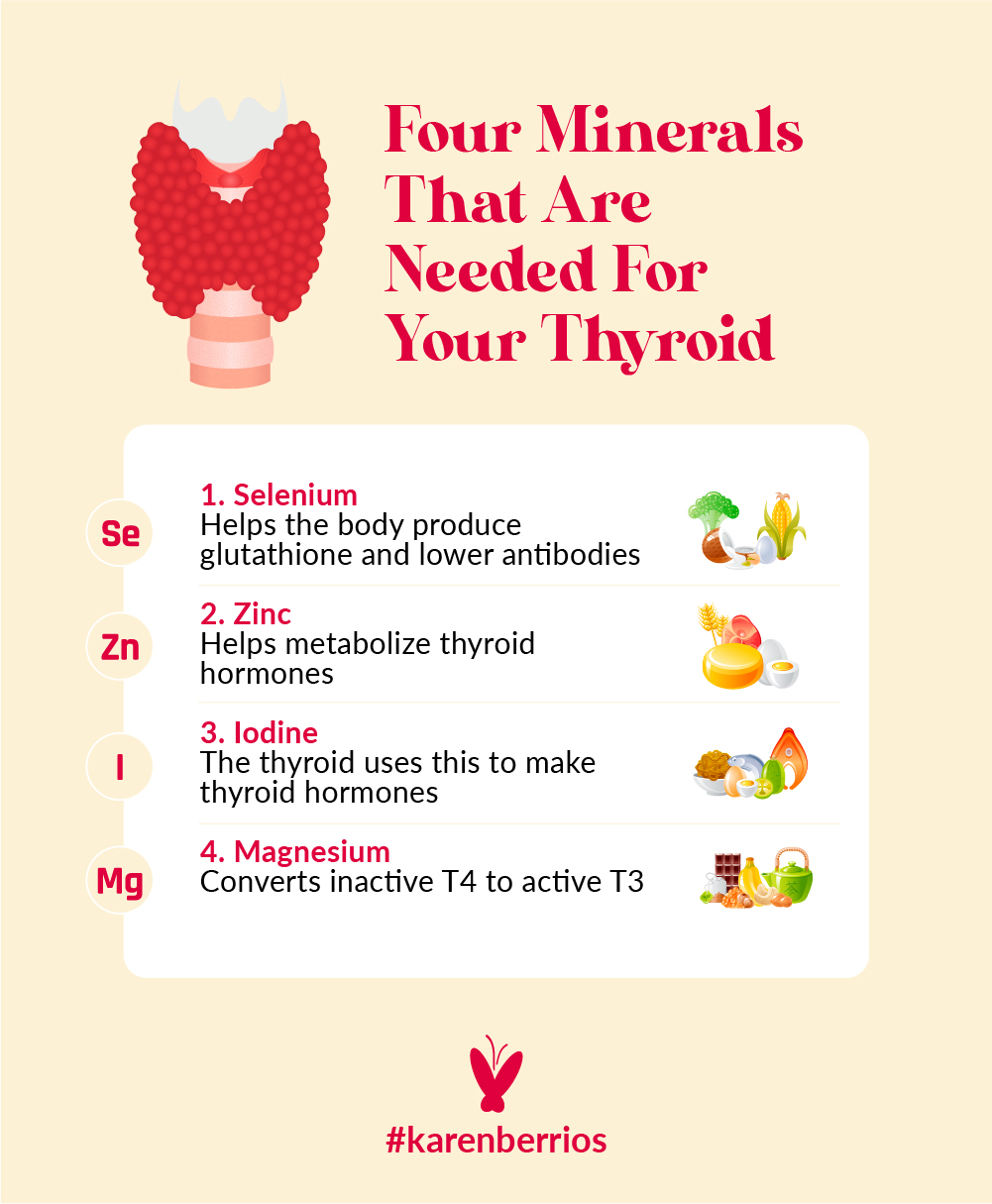

4 Essential Minerals For Thyroid Health
Minerals For Thyroid Health. As someone who had thyroid cancer, I cannot stress the importance of supporting your thyroid. It is such a little part of the body, but the impact it has on it is HUGE! Many people go throughout life doing things like looking out for the gut, looking out for their liver, looking out for their brain, but so little looking out happens for the thyroid. I want you to be ahead of it when it comes to your thyroid. Whether you have issues now or it’s in your goals to keep your thyroid health revved up- this article is for you as we’ll be going over the thyroid function and also essential minerals that you will need on a daily basis.
Thyroid Gland Function
The thyroid gland function is an important one! What it does is produce specific hormones. Hormones are molecules, or rather chemical messengers, that are secreted into the blood. They help regulate specific processes within the body like hunger, sexual desire, blood pressure, and more. They are very fundamental parts of the body.
So let’s talk about thyroid hormone function. Let’s dial-in: The thyroid gland hormones regulate the body’s metabolic rate, controls the muscle and digestion function, are important for brain development and also bone maintenance.
The correct functioning of the thyroid gland depends on getting in enough specific nutrients. The cells that produce these specific thyroid hormones are unique in that they extract and absorb iodine (one of the minerals we will cover) from the blood and then embody it with thyroid hormones– all together a very important process!
What vitamins and minerals are good for thyroid?
Let’s cover essential nutrients for the thyroid! Specifically: minerals! I am a huge believer in food being medicine. Seriously, it is one of my mantras for life. I believe that food can either heal you or harm you- with little gray area in between. Always be thinking about your health!
One thing I want to note, while we discuss these valuable mineral sources, is the amount you are taking in. Before you read any of these, consider this quote from Today’s Dietitian:
“Many nutritional factors play a role in optimizing thyroid function. However, both nutrient deficiencies and excesses can trigger or exacerbate symptoms. Working in collaboration with a physician is ideal to determine nutritional status for optimal thyroid health.”
This is a reason why I am also so big on testing. Asking your doctor to test the level of these minerals in your blood would be a great thing! Another quote from the article above talked about the dangers of missing OUT on these important minerals for the thyroid:
“…Thyroid disease presents unique challenges due to undesired weight changes, significant cardiovascular risks, and symptoms such as fatigue, mood changes, and gastrointestinal upset, which can hinder the development of healthful behaviors.”
So let’s get into some of the main minerals you should be thinking about!
1. Zinc
Zinc is important because it has a direct correlation with your thyroid metabolism- meaning it plays a role in the metabolism of thyroid hormones. This is specifically tied to regulating something called deiodinases enzymes activity and thyrotropin releasing hormone (which is abbreviated to TRH) and also TSH (your thyroid stimulating hormone) synthesis. It is a mouthful but really just think of zinc as something that helps metabolize thyroid hormones and that is a crucial part of thyroid health.
Zinc can be tricky though. You don’t ever want to have too much of it. Otherwise, you may run the risk of zinc toxicity- which is more common than you think. This often happens when people take too much zinc and is usually seen when people are starting to get sick and they are dosing very high amounts of zinc to ward the sickness off. This is not something you want to do.
But the right amount, that is what you want! Zinc is a trace element mineral. It also helps us with healthy hair, is involved in many bodily processes and of course- affects when and how the amount of hormones are made.
Oftentimes people with an underactive thyroid have low zinc levels.
Here is one of my favorite “healthy full fat” salads that is loaded with zinc! I once did an interview with Dr. Nunez who said that zinc was one of the most important minerals in the immune system as well! So try to get as much zinc from foods as you can.
2. Iodine
Iodine is probably the most notable when it comes to minerals that support the thyroid! It is a mineral that is naturally found in the earth’s soils and oceanic waters. It is a trace element that is presented in some foods (often salty foods) and is definitely needed by the body- especially the thyroid!
Another use for iodine is as a disinfectant-of-choice for surgeons as iodine is a very powerful anti-microbial! A really cool fact about iodine is that when a sufficient amount of iodine is present within your blood, it can kill harmful microbes and help our body fight off infection!
If you have thyroid cancer, there is a big chance you are low on iodine. When you don’t get enough iodine in your diet you run the risk of thyroid conditions (hypothyroidism for example) and that can then be problematic for being a catalyst for thyroid cancer.
I will say this about iodine (and it’s a shame)– most of the iodine rich foods are of the animal protein variety. So personally I supplement with something plant based and I tend to reach for iodine rich foods that are not animal protein such as sea vegetables.
Other plants that are high in iodine are kale, green beans, whole grains, watercress and potatoes… but make sure you keep the skin on and get them organic!
Unless you are undergoing radioactive iodine, you should be making sure you are getting adequate iodine in your diet!
Another thing to note about iodine is that you should approach it cautiously and work with a practitioner if you are supplementing because too much of it can also be risky (just like zinc.) Dr. Kara Fitzgerald said this about getting in too MUCH iodine:
“…We want to be very careful about not overdoing iodine supplementation. In my practice, I generally do not exceed 500ug of iodine in those that have thyroid dysfunction, and even lower for folks with autoimmune thyroid disease. I always carefully monitor thyroid function tests, antibodies, and iodine levels to ensure our approach is safe and successful.”
A good practice would be testing your iodine levels regularly!

3. Magnesium
Magnesium is super important for the body and often people are deficient. Magnesium plays a role in regulating nerve and muscle function, regulating blood sugar levels, blood pressure… and is even involved in helping the structure of DNA, bone and protein! But what most people don’t know is that magnesium plays a HUGE ROLE in thyroid health!
Right off the bat, we should note that being severely low in magnesium (which is more common than you think) is linked to hypothyroidism. Why is this? As Paloma Health puts it:
“We need magnesium to convert the inactive thyroid hormone T4 into the active thyroid hormone T3. Without this conversion, cells do not receive the more potent form of thyroid hormone. Therefore, when magnesium levels are low, our thyroid is not able to function correctly.”
We need to be sure we are focusing on magnesium-rich foods. This includes pumpkin seeds, chard, avocado, spinach, cacao, and figs! One thing to note is that while magnesium is present in many different foods- it often is not enough. Supplementation is key to keep our magnesium stores up for our thyroid.
The thyroid cannot function without magnesium. For basic magnesium supplementation, often magnesium threonate or magnesium glycinate is recommended.
Dr. Isabella Wentz, who has dedicated her whole life to understanding hashimotos and hypothyroidism, says that magnesium is CRITICAL for people who have hashimotos. She says how it is important to look at how the liver and magnesium are tied together, and how both of those things are tied to the thyroid. She states this:
“Magnesium is crucial for liver health, and I include it as part of my liver detox protocol that I recommend as a key first step toward healing for those with Hashimoto’s. Furthermore, magnesium helps support adrenal function — another area that is often compromised for those with thyroid dysfunction. Not only will a deficiency in magnesium lead to a whole host of symptoms… research has shown that it can also have a direct impact on thyroid function.”
Of course, magnesium is crucial for your thyroid whether you already have thyroid conditions or not. At the very least, take magnesium for maintenance.
4. Selenium
Selenium is an essential mineral that helps the body both recycle and produce more glutathione- which is our body’s master antioxidant. Selenium plays an important role in the body as it does so much to protect us from oxidative stress.
The way that selenium is tied to the thyroid is that it is needed for proper thyroid function and our metabolism. (Remember, our thyroid and metabolism go hand in hand).
Being deficient in selenium can overtime trigger autoimmune and other thyroid diseases. Selenium is so important that it has even been shown to reduce antibodies in those with hashimotos by 40%! Selenium is one of the most common deficiencies that doctors see in their patients with hashimotos.
This is because, again, selenium is needed for healthy thyroid hormone synthesis. Our thyroid gland has the most selenium (gram for gram) of any other tissues among all the organs within our bodies. This essential mineral supports the conversion of inactive thyroid hormone T4 into the form our body needs, T3.
Because selenium goes after oxidative stress, it makes sense that selenium also protects our thyroid cells from damage during the conversion process.
Foods high in selenium include: Nuts, seeds, lentils, brazil nuts and beans! If you are trying to avoid animal protein– which also has selenium within it.
Symptoms of low thyroid function
Now that you know of the minerals to support your thyroid, let’s talk about what the symptoms are for low thyroid function.
According to NHS, low thyroid symptoms can be (but are not limited to):
- Tiredness
- Being sensitive to cold
- Weight gain
- Constipation
- Depression
- Muscles aches and weakness
- Muscle cramps
- Dry and scaly skin
- Brittle hair and nails
- Loss of libido
- Pain, numbness and tingling sensations
- Irregular or heavy periods
Foods that help thyroid function
I thought I would list out some foods that help low thyroid function in general as many of these contain the very minerals you should be reaching for!
Here are they are compiled from this article: -Nuts (Brazil nuts in particular)
-Seeds
-Lentils
-Beans
-Pumpkin seeds
-Chard
-Avocado
-Spinach
-Cacao
-Figs
See my main list of thyroid healing foods here!
Final thoughts
Make sure you work with a practitioner that hears your concerns with thyroid health and is also willing to test for these minerals! Thyroid health is crucial and I want you to be your best self! You deserve to feel healthy and vital and a strong thyroid is a key for that! So cheers to you and your thyroid health– with a cup of chamomile tea in hand. Great for the thyroid, by the way. 🙂

hey there
I'm Karen!
I have found my cancer journey to be a positive and profound transformational experience. I’m inspired to share my healing journey here, and trust you’ll find hope, encouragement and purpose as you discover the healing power that lies within you.
Join
The Mailing List!
By signing up for my newsletter, you agree with our Privacy Policy and Terms & Conditions.


